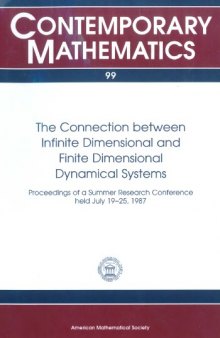 جزییات کتاب
جزییات کتاب
The last few years have seen a number of major developments demonstrating that the long-term behavior of solutions of a very large class of partial differential equations possesses a striking resemblance to the behavior of solutions of finite dimensional dynamical systems, or ordinary differential equations. The first of these advances was the discovery that a dissipative PDE has a compact, global attractor with finite Hausdorff and fractal dimensions. More recently, it was shown that some of these PDEs possess a finite dimensional inertial manifold--that is, an invariant manifold containing the attractor and exponentially attractive trajectories. With the improved understanding of the exact connection between finite dimensional dynamical systems and various classes of dissipative PDEs, it is now realistic to hope that the wealth of studies of such topics as bifurcations of finite vector fields and ``strange'' fractal attractors can be brought to bear on various mathematical models, including continuum flows. Surprisingly, a number of distributed systems from continuum mechanics have been found to exhibit the same nontrivial dynamic behavior as observed in low-dimensional dynamical systems. As a natural consequence of these observations, a new direction of research has arisen: detection and analysis of finite dimensional dynamical characteristics of infinite-dimensional systems. This book represents the proceedings of an AMS-IMS-SIAM Summer Research Conference, held in July, 1987 at the University of Colorado at Boulder. Bringing together mathematicians and physicists, the conference provided a forum for presentations on the latest developments in the field and fostered lively interactions on open questions and future directions. With contributions from some of the top experts, these proceedings will provide readers with an overview of this vital area of research



 دانلود کتاب
دانلود کتاب

 جزییات کتاب
جزییات کتاب





 این کتاب رو مطالعه کردید؟ نظر شما چیست؟
این کتاب رو مطالعه کردید؟ نظر شما چیست؟
